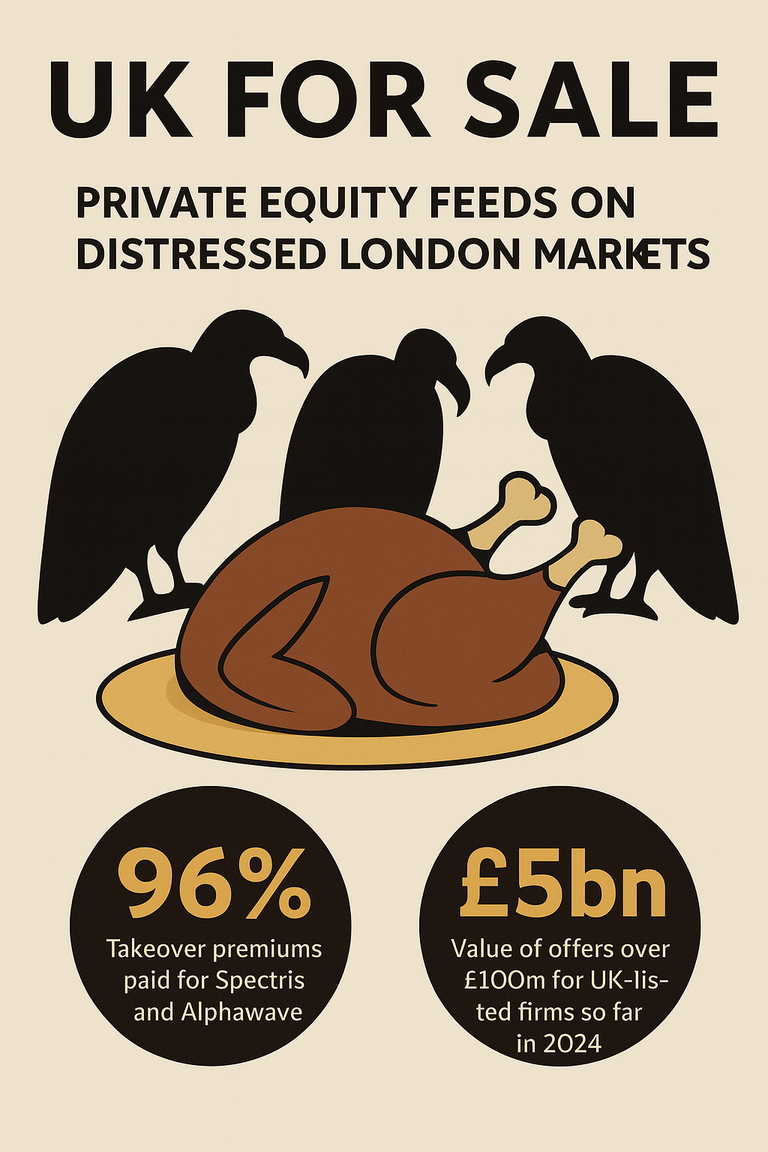The Problem of London's Undervalued Stock Market
Private equity is acquiring UK-listed firms at premiums that make the public markets seem ridiculously cheap.
To cite an extreme example industrial firm Spectris, whose turnover last year was £1.3bn and pre-tax profit £191m, was acquired by US-based private equity giant KKR at an eye-watering 96% premium on its share price.
Similarly, another 96% takeover premium was paid for chip design firm Alphawave in the same month.
The message? London's stock market is a mess — most notably in mid-cap and small-cap sectors, where "huge pockets of undervaluation" are drawing in private equity like vultures to a carcass.
A report by Peel Hunt points to the trend: 30 offers worth £100m or more for UK-listed firms so far this year, worth over £25 billion. One new listing of comparable size has occurred in contrast. The stock exchange is not growing — it is being raided.

A failing stock market....?
The phenomenon hides an even deeper problem. Britain's stock market, once a thriving epicenter of capital formation and business transparency, is increasingly coming to be perceived as a bargain basement. Private equity groups — with access to liquidity, credit, and no need to be transparent about their businesses — are content to jump in. Once they have acquired these under-priced businesses, they restructure, repackage, and resell — often with fat returns.
The problem here is not one of money, it is a problem of strategy. When public markets fail to fairly value companies, we lose transparency and accountability. Private equity, as effective as it is, has a tendency to take companies out of the public eye, with less scrutiny of working conditions, environmental impact, or tax policies.
And while private equity is flourishing, UK capital markets are in a doldrums. The fact that only one substantial IPO of more than £100m this year shows just how off-putting London has become to expansion companies. The description "UK for sale," borrowed from Peel Hunt's report, captures the mood precisely.
Final thoughts...
A healthy economy needs a healthy stock market — one in which innovation is compensated, capital is raised honorably, and companies mature in public view. If all the valuable stuff gets sorted into private hands, what's left for common investors, pension funds, or policy makers who wish to foster a fair economy?
Britain isn't just witnessing a blip — it's witnessing a collapse of its financial system. The longer this drags on, the more we're going to wake up and realize: the market wasn't just undervalued — it was being dismantled.
Posted Using INLEO
A healthy stock market ought to represent genuine value and encourage growth not turn into a secondary concern eclipsed by private interests.
There's something odd about these valuations for sure.
It seems that big money just exists to make more money rather than benefit society. I hope there are people out there who actually want to build something.
I'm sure there are, just maybe independently of these bizarre valuations!